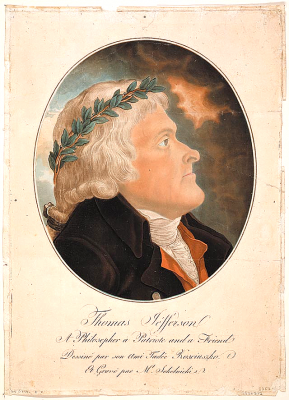

"Devoted to his country's cause, The rights of Man and equal laws,
His hallow'd pen was given;
And now those rights and laws to save, From sinking to an early grave,
He comes, employ'd by Heaven.
- "The People's Friend", Lyrics by Rembrandt Peale, music by John Isaac Hawkings, 1801
Why was Thomas Jefferson elected President of the United States? Leaving aside the complicated procedures of the actual election, what caused people to vote for Jefferson? Neither Jefferson nor Adams publicly campaigned, or had a particular platform. Instead, voters were influenced purely by propaganda in partisan newspapers. Based on the pro-Jefferson propaganda, if Jefferson did run on a platform in the election of 1800, it would have been the accomplishment that was printed and glorified above any other: his authorship of the Declaration of Independence.
Yes, the other members of the Committee of Five (including his future opponent, John Adams) edited Jefferson’s draft of the Declaration. And yes, there were outspoken individuals in this period that defended John Adams’ role in the drafting process and diminished Jefferson’s. Fear not -- they will be featured in next month’s blog. This month, read a sampling of the grandiose passages praising Jefferson and, more importantly, the Declaration of Independence, during the election of 1800.
To set a Jeffersonian mood, listen to “The People’s Friend,” a song written for the occasion of Jefferson’s inauguration.
These excerpts are all taken from articles, toasts, and opinion pieces published in American newspapers from 1800 through March 1801. Bolding of particularly noteworthy phrases added by the author.
American Citizen and General Advertiser, May 19, 1800 (New York, NY)
"The declaration was made upon the most firm and republican ground; and its author, Mr. Jefferson, must stand in high estimation with the citizens of the United states, so long as they believe the power of the people to be superior to that of kings. But one observation is still necessary upon this subject; that if Thomas Jefferson, in his political conduct or sentiments, has deviated from the principles contained in the declaration of independence, he ought never to be president of the United States. But we say that he never deviated; that he is still a firm genuine & republican—that his official conduct proves this—that it is proved by his notes on Virginia—that it is proved beyond all contradiction by the aristocratic, but dying faction of this country."
American Mercury, May 29, 1800 (Hartford, CT)
"Will they ever make people believe, that the author of the declaration of American Independence, that the man who has been uniformly attached to this Independence, 'possesses no substantial principles of honor or honesty?' We trust that every honest republican will spurn at such calumnities, and let them recoil on the heads of their authors."
The Independent Chronicle and the Universal Advertiser, May 29, 1800 (Boston, MA)
"At an early age, he had the glory of conceiving and of composing the most sublime production of genius, which either the ancient or modern world has exhibited ... When Mr. Jefferson wrote the declaration of independence, even his mind could scarcely have penetrated the bosom of futurity, so as to have anticipated the astonishing effects of his own composition."
The Carolina Gazette, May 29, 1800 (Charleston, SC)
"When called out of retirement, he was distinguished as a state legislator, and in the memorable congress of 1776, he it was that immortalized his country and himself, in framing the DECLARATION OF INDEPENDENCE. By that indelible charter he has remained firm, while numbers who subscribed and rose into consequence by their subscription have deserted it, and would now trample on the declaration, its author, and the liberties which were atchieved under the banners raised to defend it."
The Constitutional Telegraphe, May 31, 1800 (Boston, MA)
"Federal aristocracy is fast depreciating—peace will be made with France—the framer of the declaration of our Independence, the immortal JEFFERSON will be our next president, and the character of American liberty saved from everlasting destruction."
The Times; and District of Columbia Daily Advertiser, June 18, 1800 (Alexandria, VA)
"Every thing which he has written or spoken glow with republican sentiments. The declaration of independence, the Virginia act of 1785 for religious freedom, the political part of his notes on Virginia, his inestimable diplomatic correspondence, his admirable report to Congress in 1793 respecting regulations of commerce, all shew that he is a friend to the independence and the freedom of his country; to economy, and a sufficient degree of energy in the administration."
The Independent Chronicle and the Universal Advertiser, June 19, 1800 (Boston, MA)
"... the genuine republicans and lovers of liberty in America, have but one object, and that is the preservation of that genuine sentiment, the immortality of equal rights. To complete this object, they have direct their attention to Mr. Jefferson, and him they mean to support—they are determined, if possible, that he shall be the next President, and in effectuating this object, they have commenced by boldly announcing it. Every thing is clear and determinate—no dark and mysterious plans to be unfolded, but steady to the principles that gave birth to the revolution, the republicans are determined that the author of the Declaration of Independence shall receive their united suffrages, and become the first magistrate of this free and independent nation."
American Citizen and General Advertiser, July 3, 1800 (New York, NY)
"It [the Declaration] was written by Jefferson, whose genius, talents and republican virtues, justly intitle him to the highest honours—the most exalted station that his country has to bestow."
The Universal Gazette, July 17, 1800 (Philadelphia, PA)
Toast from a 4th of July celebration: "Thomas Jefferson, the author of American Independence. May he at the ensuing Election meet with that succcess [sic] which he deserves, and may he take the helm of Government and steer it into the Haven of peace and safety."
Newport Mercury, August 12, 1800 (Newport, RI)
"Let me intreat you therefore, fellow-citizens, ... if you regard that Independence which cost us so much blood and treasure, to choose republican representatives, who will if the choice should devolve upon them appoint republican electors, who will make choice of Thomas Jefferson, the just, as President of the United States. You need not be told, was it not for the pleasure of repeating it, that he is the author of that sublime instrument, the Declaration of American Independence, which severed us from the galling yoke of British Despotism, he is therefore the most likely to endeavour to preserve that independence inviolate, the declaration of which was the work of his own hand; for it is a principle inherent in Man, to wish to see his own works triumph."
Genius of Liberty, August 28, 1800 (Morristown, NJ)
"... permit us to turn your attention to the author of the Declaration of Independence. We are not in the habit of sacrificing at the shrine of adulation, nor even of swelling too high the stream of merited applause. The placid reflection of having deserved the gratitude of a free country, is the highest reward to a virtuous mind. Yet we think if ever any political character would justify a handsome eulogy, Thomas Jefferson is that character."
American Citizen and General Advertiser, September 1, 1800 (New York, NY)
"As a learned and experienced statesmen, [sic] Mr. Jefferson rises superior to the level of his rivals; he is the author of the declaration of independence, which in point of energy as a composition is equal at least to the Philippics of Demosthenes; ..."
The Constitutional Telegraphe, September 3, 1800 (Boston, MA)
"... it was from the enlightened mind of Jefferson, first named in the committee, that, the glorious instrument proceeded, which was reported to the committee, and unanimously adopted by congress, entitled, 'The Declaration of Independence, &c.' An instrument which, so long as the records of time shall endure, will perpetuate the fame of its author, and preserve, in the American mind, forever and inseparable, the names of Independence and Jefferson."
Centinel of Freedom, October 14, 1800 (Newark, NJ)
"It is not to the man, but to that confidence which his character and virtues, his talents and experience inspire, we call you. Let us therefore, taking the Declaration of Independence in our hands, and carrying its principles in our hearts, let us resolve to support Thomas Jefferson, whose whole life has been a comment on its precepts, and an uniform pursuit of the great blessings to his country which it was first intended to establish..."
The Maryland Herald and Elizabeth-Town Advertiser, October 30, 1800 (Hagerstown, MD)
"Let us, citizens of Frederick County, taking the Declaration of Independence in our hands, and carrying its principles in our hearts, unite in solid columns, on Monday the 10th day of November, and proceed to the polls in our respective districts, then and there freely give our suffrages to Dr. TYLER, the Republican candidate; who has pledged himself if elected, to vote for THOMAS JEFFERSON, the advocate of Freedom and Independence."
The True American, March 17, 1801 (Trenton, NJ)
Toast to celebrate the inauguration: "The President of the United States—May the Author who dictated the Declaration of Independence, be the instrument to restore the nation, to the purity of Republicanism, from which it has been so long perverted."
American Mercury, March 19, 1801 (Hartford, CT)
"The Speech of Thomas Jefferson, previous to his entering on the duties of President, has deservedly received the approbation of every republican and honest man. It is but what was to be expected from the author of the declaration of our existence as a nation; and is of such a complexion as cannot but convey pleasure to the minds of all men, of whatever party, who have the good of their country at heart."
Bonus: A Declaration Death Hoax!
In late June 1800, a rumor spread that Thomas Jefferson had died (and, therefore, could not be elected president). The timing of this rumor, just before the anniversary of the Declaration of Independence, cannot be ignored. And, unlike death hoaxes spread on the internet today, it took days for the rumor to reach most readers, and several more days for retractions and corrections to calm the public's fears (and, in some instances, quash those anti-Jeffersonians who hoped the rumors were true). The rumor was allegedly spread by Joseph King, a boot and shoe manufacturer who had declared in a local porter house that "the bells of this city ought to be rung with joy at the news of Thomas Jefferson's death."
An article printed in the Aurora and reprinted in several other newspapers, entitled "A FEDERAL BORE." disproved the rumor, while hinting that it had been spread by Federalists: "The editor is in possession of a letter from a federal office at Baltimore, declaring it to be a fabrication intended to damp the festivity of the 4th of July, and prevent the author of the Declaration of Independence from being the universal toast of the approaching auspicious festival. Mr. Jefferson was in his usual good health on the 28th instant."
The irony of this rumor is that, of course, twenty-six years later, both Mr. Jefferson and Mr. Adams were in poor health in late June, and both died on the 50th anniversary of the Declaration of Independence. As for Joseph King? He wrote to printer D. Denniston denying the accusations against him. Denniston printed the letter in his newspaper, explaining that the rumor of Jefferson's death "was not made by him, but by a Mr. Mills, an Englishman;--and Mr. King only observed, that it would be the best thing that ever happened to this country."
For the pro-Adams perspective, check out our June Highlight: Atlas of Independence!
Special thanks to Cari Kramer. For more, listen to Jefferson's March. All newspaper excerpts taken from the America's Historical Newspapers collection on Readex, accessed through Harvard University.
By Emily Sneff

